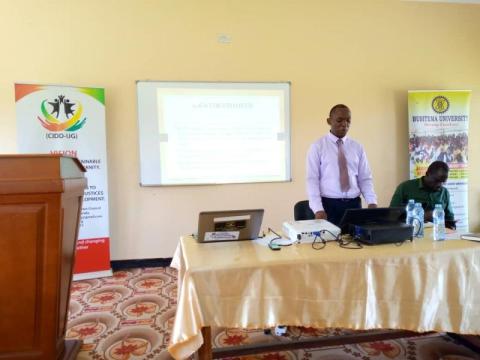
Leaving No One Behind: CIDD-UG Strikes a Partnership with Busitema University to run Public Lectures to Induce Public Private Partnership for Achieving Sustainable Development Goals (SDGS).
Partnerships for the 2030 Agenda should be inclusive, within principle of an equal weight of CSOs, Academia, business and government organizations. Said Mr. Ejautene Fred ED-CIDD-UG
OVERVIEW
Uganda, was one of the first countries to develop its 2015/20 National Development Plan NDP in line with the SDGs. The Government estimates that 76 percent of the SDGs targets are reflected in the plan and adapted to the National context which is a good gesture. Equally, the UN Country Team has supported the government to integrate the SDGs into Sub-National Development plans, in line with the National Plan and Uganda’s Vision 2040.
Though it is extensively accepted that Cooperation and partnership that is also at the core of the 2030 Agenda is not only a vehicle for supporting development and social transformation, but also promotes access to and utilization of basic social and protection services that advances human rights and well-being of people in Uganda, and protecting the planet, achieving this cooperation and partnership at the sub National level is still a challenge and yet the 2030 agenda on SDGs wishes to live no one behind.
What is CIDD-UG currently doing about it?
For purposes of galvanizing efforts to immensely ensure cooperation, building strong partnerships and enhancing coordination in public sector management that will in turn stimulate multi stakeholder interest to contribute to the achievement SDGs, CIDD-UG in partnership with Busitema University under the pilot project titled: “Strengthening Evidence Based Public Policy and Democratic Governance Engagement Agenda in Bukedi sub region” embarked on a strategy of conducting expert public lectures with sub National Governments, academia and private sector religious and cultural institution to induce and strengthen coordination and public private partnership (PPP) for social protection and creation of resilience among institutions for achievement of SDG 6. A cross section 100 sub national level leaders have so far been met and interest to partner, coordinate and collaborate has been aroused.
The quarterly stakeholder’s public lectures are considered by CIDD-UG as an important avenue for convergence between the theories and practices of policy discussions, public sector management and service delivery engagements at both national and sub national level. The lectures provide space for the Academia and CSOs to share research findings but also engaging on emerging service delivery issues with policy makers or Local Government leaders and other key stakeholders for desired policy change or improvement.
CIDD-UGs’ first public lecture was conducted on 4th. April 2022 in Busitema University conference hall, Pallisa District under the theme Putting Hygiene and Sanitation into Perspective “Is it sanitation hardware or behavioral change that will lead the world into achievement of SDG 6 on clean water and sanitation”? The keynote speaker was Dr.Kalenzi Abbey, the Deputy Dean of Busitema University and participants to the public lecture included Local Government leader, academia, private sector, CSOs, cultural and religious leaders. Altogether 100 participants from a cross section of leader at sub national level attended the expert lecture.
The expert public lectures have been viewed by stakeholders as one of the mutually re-enforcing and beneficial strategy to mobilize and organize around the common Global agenda using more expert view that is creating purposeful convergence around SDGs to ensure that no one is left behind.
The key issues that emerged from the key note presentation that may affect the achievement of SDG6;
1) Weak Partnerships and collaboration
2) Weak institutions and low capacities
3) Lack of transparency in Ideals, conflicts of interest and corruption
4) Popular distrust.
5) Governments losing political will to promote PPP
6) Treating people as being secondary rather than being primary partners.
7) Poor coordination across the boa
Key actions and policy recommendations during the Public Lecture.
A. Need to strengthen partnership and collaboration with academic institutions, CSOs especially in areas of social research as the key driving strategy to inform local government policy on planning and budgeting process.
B. People have to be put first
C. Need to build the skills within the government and set up the right institutions
D. Zero tolerance to corruption
E. Choosing the right partners.
Conclusion
A number of challenges that slow down the progress in achieving SDGs have persisted. These constraints are not insurmountable and should therefore be addressed effectively.
